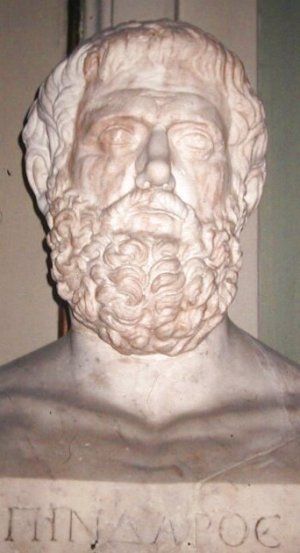The directory «Plots»
Pindar (Πίνδαρος)
(518–438 BC)

Greek poet, generally regarded as the greatest Greek lyric poet. A Boeotian of noble birth, he lived principally at Thebes. He traveled widely, staying for some time at Athens and in Sicily at the court of Hiero I at Syracuse and also at Acragas (modern Agrigento). His chief medium was the choral lyric, and he set the standard for the triumphal ode or epinicion. Of his complete works 45 odes survive; these make one of the greatest collections of poems by a single author in Greek. His fragments are exceptionally numerous and some of them widely famous. The epinicia celebrate victories in athletic games: there are 14 Olympian odes, 12 Pythian odes, 11 Nemean odes, and 8 Isthmian odes. Each was written to be sung in a procession for the victor, usually on his return to his home city. The outstanding feature of each ode is its narrative myth, which is always connected with the winner. The myth makes appropriate the elevated moral tone and religious flavor characteristic of Pindar’s poems. His style loses a great deal in translation. It has a high-flown diction and an intricate word order, dependent partly upon the complexity of his metrical requirements. Pindar wrote on commissions, but he was quite independent of any meretriciousness, because of his lofty conception of the poet’s vocation.
The term Pindaric ode refers to a verse form used primarily in England in the 17th and 18th cent. The form, based on a somewhat faulty understanding of the metrical pattern used by Pindar, originated with Abraham Cowley in his Pindarique Odes (1656) and was later used by John Dryden, among others. It is characterized by irregularity in the rhyme scheme, length of the stanzas, and number of stresses in a line.
Ajman, 1972, The Parnassus
Cambodge, 1983, Poets
Greece, 1968, One of Pindar's Odes
St. Vincent, 1993, The Apotheosis of Homer